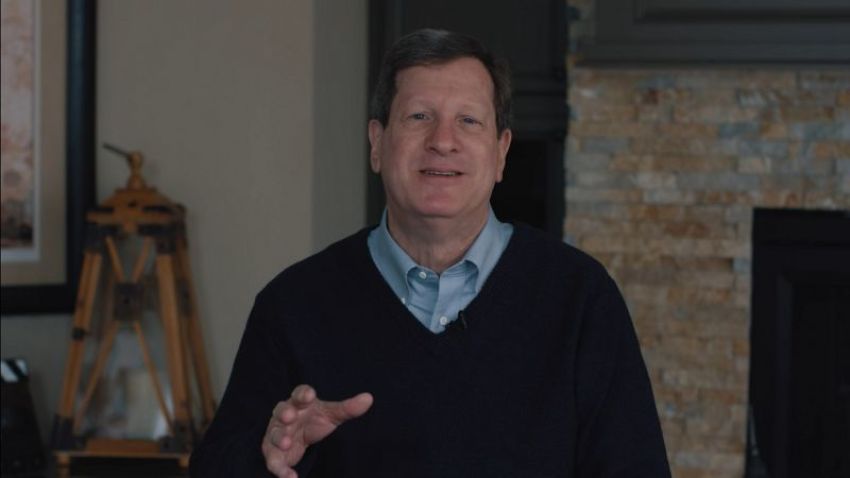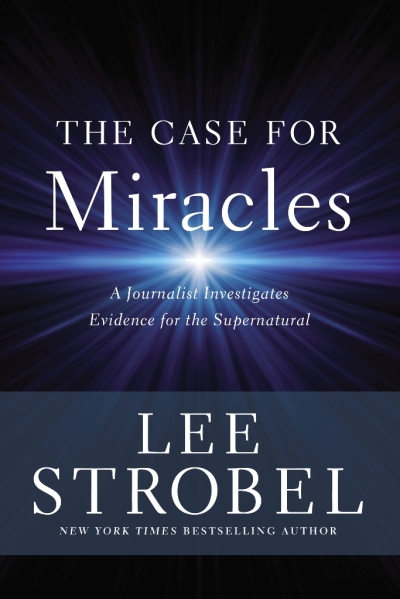Lee Strobel Makes the Case for Miracles to Christians 'Embarrassed' by the Supernatural

The Case for Christ author Lee Strobel is out with a new book making the case for miracles to an evangelical Christian audience, who is in many ways "embarrassed by the supernatural," he says.
"And by [embarrassment] I mean they want to be respectable by their neighbors, they don't want to be conflated with some televangelist, strange or over the top," said Strobel in an interview earlier this month with The Christian Post about his new book The Case for Miracles: A Journalist Investigates Evidence for the Supernatural, which is set for release next Tuesday.
"In many evangelical circles there's almost a skepticism toward the miraculous or a downplaying of the supernatural out of this sense of wanting to set themselves apart from the excesses we've seen in some circles," he explained, noting he hopes the book proves helpful for both the spiritually curious and committed Christians who wonder if God continues to intervene in the world today.
As with his other "Case for" books, Strobel in his latest work interviews theologians, scholars, and experts from a variety of fields, including Roger Olson, a professor at Baylor University whose April 2015 essay, "Embarrassed by the Supernatural?" on Patheos, particularly resonated with him.
Olson wrote at the time that when he gives his Latin American, Asian, and African theology students absolute freedom to be totally transparent about what they think of American evangelical Christianity they often say that they are "shocked" by its individualism, consumerism, and lack of belief in the "spiritual world," meaning the supernatural.

Olson elaborates on these themes in an entire chapter in Strobel's new book.
For some, objections to the supernatural are rooted in their view of science. And even though God cannot be put in a test tube and miracles cannot be replicated in a lab, the author maintains that there is a role for science when it comes to the supernatural. In the book, Strobel features peer-reviewed scientific studies that have pointed toward prayer as being effective to some degree in the healing of people.
He also features the scholarship of Candy Gunther-Brown of Indiana University who has done studies in Brazil and Mozambique where researchers tested people before and after they received prayer for their hearing and vision from Christian ministers, the results of which have been published in the Southern Medical Journal.
"People define miracles in various ways," Strobel explained, "and the definition I like comes from Richard Purtill, who was a professor of philosophy at Western Washington University and is now deceased.
"He said a miracle was an event brought about by the power of God that is a temporary exception to the ordinary course of nature, for the purpose of showing that God is active in history."
Strobel operates with this definition throughout his book.
"And when we see documented cases that point to the miraculous today it gives more credibility to the miracles that we see in Scripture," he said, noting that such was an important point of Asbury Seminary professor and New Testament scholar Craig Keener's research in his two-volume work on miracles.
The Yale-trained journalist hired Barna Group to survey Americans about their attitudes toward miracles, the results of which he discloses in the book.
Approximately two thirds of Americans said that they believe miracles are possible today wherease only 15 percent said they are not. More interestingly, 38 percent of respondents reported having an experience in their lives that they could only attribute to a miracle of God.
"When you extrapolate that, that's almost 95 million miracles among Americans," Strobel said.
"Now, discount 95 percent of those, let's say, as being strange coincidences. You still have 5 million examples of people saying 'I've had an experience in my life that I can only explain by saying it's a miracle of God.'"
From this he deduces that not only have miracles continued today but are much more common than many have been led to believe.
"Fifty-five percent of physicians say they've seen results in their patients that they consider miraculous," he said, dispelling the notion that only uneducated people claim to believe in miracles.
Strobel documents several miracle claims that are well-attested by both medical evidence and credible eyewitnesses, "and the only way you could deny them is by having an anti-supernatural bias," he continued.
That the author is regarded as a mainstream evangelical is perhaps evidence of the growing awareness of the supernatural being taken more seriously in the many churches, even if embarassment on the subject lingers.
"And it may be more credible, this stuff, coming from a guy like me who is not known — I think people perceive me as being a nuts and bolts, give me the evidence, fact-based individual — maybe doing a book on miracles that will be more valuable in the end than coming from a someone with a charismatic background who, people would say 'well, sure that's coming from them, of course they believe that.'"
But before making his case for the miraculous, Strobel engages someone who fervently disagrees with his thesis.
In the first three chapters of The Case for Miracles, the author interviews Skeptic magazine editor Michael Shermer, in which Shermer makes his own case against miracles.
"I think it's important that we [as Christians] recognize what are the arguments for the evidence against the miraculous," the author made a point to say, adding that he thinks the rest of the book overwhelmingly answers Shermer's skepticism.
Strobel writes candidly in the book about the first time he was asked to pray for the sick and anoint them with oil.
"I felt this conflict within me," he recounted of his thought process at the time.
"Do I come out and specifically ask for healing? I mean, I can ask that God guide the hand of the surgeon. I can ask for the relieving of pain. But do I actually come out and pray that they be miraculously healed? Because golly, my credibility is at stake. What if they're not healed? I'm going to feel bad."
He prayed, feeling the internal conflict acutely, but pushed through his hesitation with the supernatural.
"We like things buttoned down [theologically] but God is not buttoned down," he realized, speaking of the attitude of many Christians.
Aside from the spirited theological debates over cessationism, the view that the gifts of the Holy Spirit spoken of in 1 Corinthians 12 and 14 — including the working of miracles — ceased with the death of the last apostle or the closing of the canon of Scripture, versus continuationism, the perspective that such gifts have remained operational to the present day, Strobel urges Christians to observe what is happening in real time worldwide.
"In my book I say ... let's look at what's occurring, let's look at what's going on. Let's look at the fact that 50 percent of the people who join the Christian church in China either themselves or know someone who has been healed. And it's fueling the growth of the church in many [other] places in the world."
"And you just can't turn a blind eye to this," he stressed. "We've got to take this seriously."
Miracles are "signposts" that point people to God, Strobel said. These supernatural acts highlight aspects of God's character: His goodness, His love, His involvement in our affairs, and His proximity to us.
"I think some people focus on the miracle itself as opposed to looking beyond it and asking: What is the point of it? What does it tell us about God?" he said.
In an age when the contrast between good and evil is more and more visible, Strobel believes that such starkness will be accentuated in the future; the demonic will intensify but the power of the Holy Spirit and the miraculous goodness of God will increasingly be displayed, he said.
"The Holy Spirit is going to continue to do things that will astound us and point us toward our only hope, which is God," he said.
Strobel realized during the writing process that he could not publish a book about miracles without discussing miracles that were prayed for but did not happen, instances where hands were laid on sick bodies, the anointing with oil ministered, and no real results appeared in the natural.
So he penned a chapter in which he interviewed Douglas Groothuis, a professor at Denver Seminary whose wife at a young age is dying of dementia.
"They've obviously prayed for her many, many times," Strobel said.
"And as the disease progresses she continues to lose her mind to the point that she doesn't know what a hairbrush is or how to work a telephone anymore."
Groothuis, being a philosopher, can speak about the theology of why miracles do not always happen in a very sophisticated manner.
"But as a husband, boy, does he talk so poignantly and powerfully about what you do in the midst of that, even to the point of ultimately praying a prayer of relinquishment, as Jesus did in the Garden of Gethsemane."
Readers will be very moved when reading Groothuis' words, he emphasized, particularly those who are in need of a miracle and are not getting one and think "Why not me?"
Strobel's wife, Leslie, knows the potency of this struggle as she suffers from fibromyalgia and is in pain daily.
"We've certainly prayed for her healing many times and it has not yet come to pass," he said.
"So how do you face that? Those are important issues we have to deal with. And, you know, the honest truth is that if God intervened in every single case we wouldn't have a predictable world in which we could do science."
The author said neither he nor Groothuis have any intention of ever ceasing to pray for their wives.


























